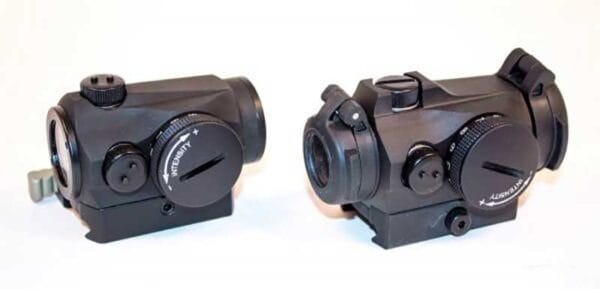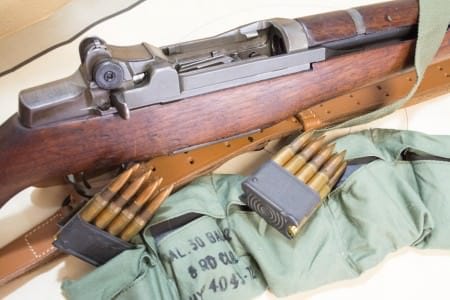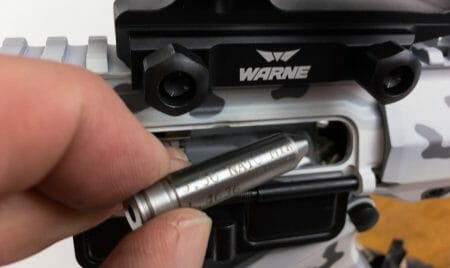Gun writer, Tom Mchale schools us on his method of picking the Best AR 15 Scopes for your black rifle.

What is the easy answer to choosing the Best AR 15 Scopes: I say “It depends”.
I’m not being bratty. Hear me out. The beauty of the AR rifle platform is the near-infinite number of applications. It can be quite adept at the following, just to name a few, uses.
- Deer hunting
- Home Defense
- Competition
- Plinking
- Close quarters combat
- Varmint hunting
- Long-range precision shooting
- Ranch rifle
- Car rifle
- Big game hunting
- TEOTWAWKI (The End of the World As We Know It)
- Fun
Each of these applications has different optics requirements, but we’ll get into that in a minute. The hard part about choosing the Best AR 15 Scopes optic is that there are as many options as there are AR rifles themselves. So let’s start narrowing the search.
The first decision to make is whether to use magnified or non-magnified. Most of us tend to default to an over-magnified situation because it’s ever so satisfying to see the dimples on that golf ball resting 100 yards downrange. Or maybe the “aim small, miss small” concept is just burned into our brains. Whatever the cause, most people choose more magnification than they really need.
But here’s the trouble with over-magnification.
Natural Wobble is Magnified
When shooting from a concrete bench, it’s pretty easy to keep your gun (and optic view) perfectly still. You can mount the Hubble Telescope on your rail and aim precisely at the dot on the “i” of a Tootsie Pop 450 yards away, with a perfectly stable view.
Now try from a standing position, and every bit of extra magnification causes a dramatic, and distracting movement of the crosshairs.
Field of View
The width and height of the visible area through your optic decrease with every extra bit of magnification. Over-magnification greatly diminishes the ability to find targets and see what’s going on downrange. As an example, let’s consider looking at a target 100 yards downrange through a Bushnell Elite Tactical SMRS 1-6.5×24 optic. At the true one power setting, you can see an area 105.8 feet wide through the scope. When you crank magnification up to 6.5 power, you can only see an area 16.3 feet wide.
You always trade viewable area for magnification.
Mirage
That distracting “heatwave” you might see while looking downrange increases with magnification. Mirage is caused by light diffraction, and your optic relies on clear light transmission, hence the problem. At higher magnification levels, the mirage at just 100 yards can become surprisingly distracting and cause misses.
That’s embarrassing when plinking, and can be tragic when hunting.
You Don’t Usually Need Much Magnification
Last, but certainly not least, much of the time, we can do a perfectly acceptable job of hitting targets without extra magnification. Provided your reticle isn’t too big, if you can see your target, you can hit it. As a real-life example, Appleseed Rifle Training program instructors teach regular folks like you and me to hit targets 400 yards distant using only iron sights.

Factors to Consider
Reticle (or dot) Size
To keep things simple, let’s consider that your aiming reticle is a simple red dot. I happen to use Aimpoint optics, and the Micro H-2 and PRO models feature 2 MOA (minute of angle) dots.

Each minute of angle translates to 1.04 inches at 100 yards, so this means that the Aimpoint dot “covers” a two-inch circle at 100 yards. A golf ball is 1.68 inches in diameter, so swagging things a little, you should be able to cover a golf ball with your red dot and hit it from 100 yards away.
If hunting, you should also able to target the vital zone of your buck 200 yards downrange, as the dot covers a four-inch circle.
Is more magnification in the best AR 15 scopes nice to have? Certainly. Is it easier to see your target with more magnification? Of course.
My point is that many shooting scenarios can be handled with zero magnification, contrary to our natural assumption.
Your Most Common Shooting Distance for the best AR 15 scopes

There are two issues to consider here. Your aiming reticle may be too “large” at your regular shooting distance to give you the precision you need.
For example, a 2 MOA dot will cover eight inches at 400 yards, as would a 2 MOA wide crosshair in a magnified scope.
If you shoot at longer ranges, the size of the dot or reticle marks can fully block your target, making it difficult to shoot with precision.
The Nature of Your Target
If you’re a tree stand hunter, you might want an optic that’s geared for shorter range shooting and allows a wide field of view, especially if your targets are likely to be moving. Speaking of moving, if that’s the type of target you’ll be frequently shooting, consider a red dot with an unlimited field of view, or perhaps a variable power scope that starts at a true 1 power. That will give you the most viewable area to quickly find and acquire your target. Tracking a moving target with a highly magnified scope is an exercise in frustration.
Your “Use Case”
The catch-all consideration for the best AR 15 scopes is this. Engineers have a fancy term called “use case,” which describes exactly how someone will use a product or feature. For example, a use case for a short barrel AR rifle with a red dot sight, purchased by a LE SWAT team member might be: This product will almost always be used indoors, at distances of less than 30 feet, in dark or near dark conditions, to hit moving targets.
So what is your most common “use case” for the best AR 15 scope? Will you use the rifle and optic as a nightstand tool to protect against bumps in the night? Do you want to start competing in sports like 3-gun? Will you go to a 100-yard range to plink cans at long distances? Or perhaps you want to hunt and might use your rifle out to a couple hundred yards. Heck, with the quality of today’s AR rifles, you may get shooting satisfaction from nailing tiny targets 500 yards out. Think about how you will most frequently use your rifle, and choose non-magnified or magnified options accordingly. And remember, don’t succumb to the temptation to over-magnify!
Now What?
So with all that said, I thought I would share a couple of recommendations of optics I’ve used with good results. This is not a comprehensive list because there are hundreds of available options out there vying for the best AR 15 scopes title.
Best AR 15 Red Dot Sights Recommendations
First, for products on which your life might depend, don’t go cheap. There is plenty of quality gear at reasonable prices.
My personal favorite red dot product line comes from Aimpoint. I keep an Aimpoint Micro H-2 on my home defense shotgun and an Aimpoint PRO on my go-to AR-15. There’s a new model that’s built specifically for AR rifles, and a bit more affordable, called the Aimpoint ACO. You can’t go wrong with any of them, and the batteries last 75% of forever.

Also in the highly recommended best AR 15 scopes category are the EOTech Holographic Weapon Sights. They make 73.4 million different varieties using different battery power sources and different reticle options. Knock yourself out shopping! What I like is the different approach to a standard red dot. Many of their reticles offer a small (and precise) 1 MOA red dot, surrounded by a 68 MOA ring. At short range, just put your target inside the circle and shoot. It couldn’t be faster.
I should also mention the small reflex sight category. Low profile options like the Trijicon RMR, Leupold DeltaPoint, and Burris FastFire are durable and effective out to a couple hundred yards. Not only are they affordable, but most of these can also be used on AR rifles, shotguns, or optics ready pistols.
Best AR 15 Scopes Magnified Optics Recommendations
My personal preference for the best AR 15 scopes use cases requiring some degree of magnification is a low-range variable power optic. There are a number of excellent choices out there in the 1-4x to 1-6.5x range.
I particularly like the Bushnell SMRS 1-6.5×24 model. Why? It has a first focal plane reticle that looks like a red dot at 1x and a finely gridded reticle at 6.5x. That’s because first focal plane reticles grow and shrink with magnification changes. With variable intensity red lighting, it’s almost as fast as a red dot at close range, and plenty precise for shots out to 500 yards or so.
I’m also a fan of the Weaver Tactical 1-5×24, for all the same reasons. The reticles are a little different, but the general idea is the same.
But first focal plane scopes are expensive, and if you want to conserve some extra bucks for ammo, then there are plenty of options for second focal plane (SFP) optics. Reticles in SFP optics always appear to be the same size. Just be aware that holdover adjustments, like holding one crosshair down or to the side, are only consistent at one magnification level. To keep things simple with SFP scopes, find your target with low magnification and zoom up to high magnification when taking that shot. That way, windage and elevation compensation using marks on the reticle is always consistent with your expectations.
Bushnell makes an excellent line of value optics for AR rifles (/c) ranging from 1-4x all the way to 4.5-18x. I particularly like the 1-4x 24mm Throw Down PCL model because it comes with a folding zoom adjustment lever and the illuminated reticle is perfect for AR rifles. A large circle surrounds traditional hash marks so it’s fast, yet offers precision at distance. The reticle is even in the first focal plane and street price is just over $250.

Also, check out the Weaver Kaspa Tactical Series. Their best-kept secret is the Kaspa Z “Zombie” scope.
Yeah, I know, Zombies, but stay with me here. The “Zombification” features are mostly stickers, so you can toss those if you have a grudge against the undead.
I like this particular model because it uses the same CIRT reticle that I find so awesome in the far more expensive Weaver Tactical scope previously mentioned. The Kaspa Z is built like a tank and features 1.5-6x magnification and an illuminated reticle. Trust me on this one. It’s a great value when considering the best AR 15 scopes.
Best AR 15 Scopes Video as Reviewed by LegallyArmedAmerica:
The Best AR 15 Scopes Out of Hundreds
I’ve only got space to list a few of the best AR 15 scopes, but there are hundreds of outstanding optics on the market for AR rifles that actually work and will hold up over time. Stick with proven brands like Bushnell, Nikon, Weaver, Redfield, Burris, and Hawke Optics, just to name a few. Those gun show specials may look sexy, but when the guts shake loose after a few shooting outings, you’ll wish you had spent just a little more on a good optic.
To me, optics make the rifle. If you’re serious about distance shooting, it’s not at all unusual to spend as much, or more, on your optics as you do on the gun itself. If you’re a recreational, home defense, or casual competition shooter, budget about half the cost of the rifle itself for your optic.
You’ll be happy you did over the long haul.
About
Tom McHale is the author of the Insanely Practical Guides book series that guides new and experienced shooters alike in a fun, approachable, and practical way. His books are available in print and eBook format on Amazon. You can also find him on Google+, Facebook, Twitter, and Pinterest.





Nikon doesn’t make rifle optics anymore. A bummer since their 1-4 lpvo is really nice